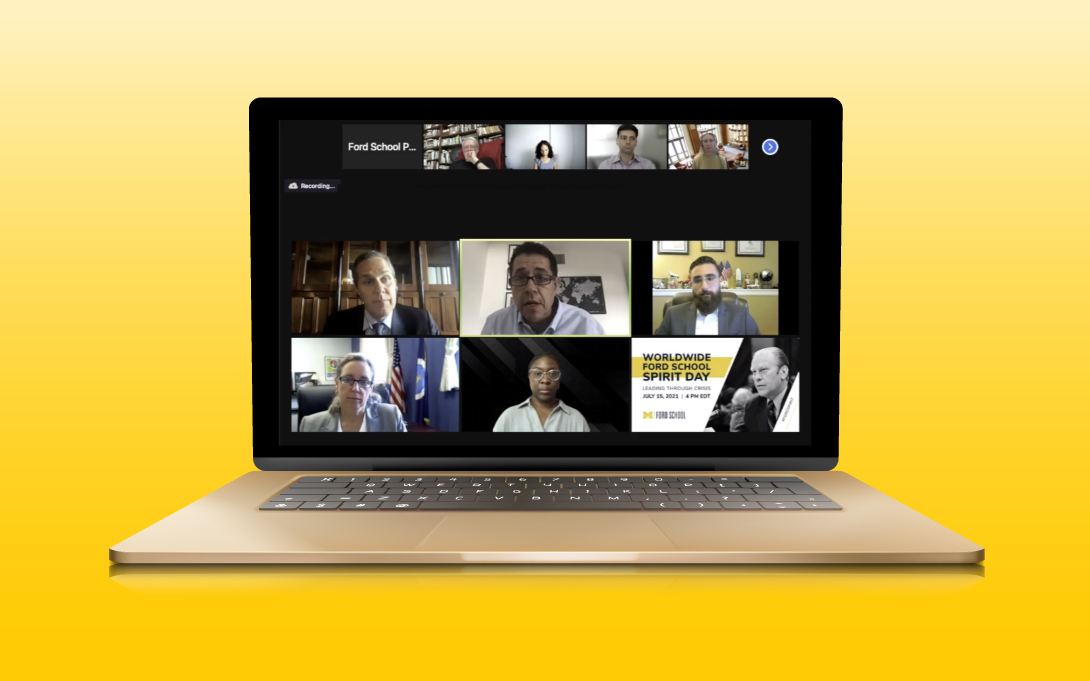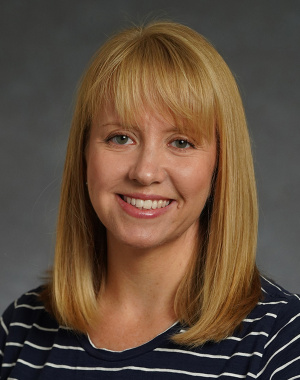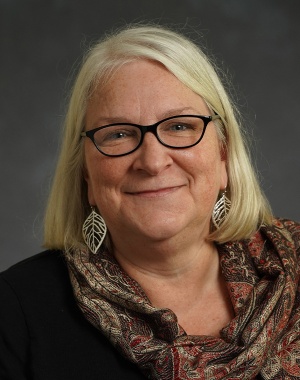
Effective leadership always requires the ability to adjust to changing circumstances. The massive disruptions caused by the COVID-19 pandemic affected both how people were able to do their jobs as well as how they could accomplish their professional goals. Four Ford School alumni reflected on how their work lives changed, and how they were able to lead through the adversity of the past 18 months, at the 11th annual Spirit Day, themed “Leading through crisis.”
Ali M. Berri (MPP ‘21), Stacy Dean (MPP '92), Portia Hemphill (PhD '15), and Alberto Rodriguez (MPA/MA '93) highlighted their work and accomplishments, as well as how their Ford School experiences helped to shape their lives. Working in local, national and international affairs, they faced similar challenges in confronting the scale of the health and economic consequences of the pandemic.
Some 100 participants from all over the country and the world—alumni, current and incoming students, as well as staff and faculty—joined in the event, which was organized by Jennifer Niggemeier and Elisabeth Johnston in the office of graduate career services and alumni relations. After the main discussion, the conversation continued in 10 breakout sessions, each with student and alumni co-hosts, which covered themes on vaccine research, COVID-19’s impact on racial and economic inequity, macroeconomics, and caregiving, politics, domestic and international crisis management, and education, among others.
Rodriguez, global director for strategy and operations in human development at the World Bank, has been responsible for providing leadership to the teams responding to the COVID-19 pandemic, including the largest global effort for vaccine financing and deployment.
He explained the scope of the problems the World Bank needed to address. “This has been a tremendous setback in the development goals. In 2020, 100 million more people are expected to enter extreme poverty just as a result of the pandemic. In this year up to this month, 23 million children have missed their basic vaccinations. And what's even worse, the school closures are expected to have an impact of $10 trillion in the losses of the affected children’s future income.”
He and his colleagues had to find new ways to reach people, even in informal economies, through quick projects that supported social protection systems, online education and laptops, and purchase of personal protective equipment (PPE). Switching the focus to vaccine financing and distribution, they confronted a lack of availability as well as lack of infrastructure – cold chains and trained technicians.
“We have two worlds, unfortunately, in this pandemic, so we still have a lot of work to do,” he concluded.
Stacy Dean was appointed by President Biden to serve as the deputy undersecretary for the U.S. Department of Agriculture (USDA)'s food nutrition and consumer services department. She works on increasing nutrition assistance, as well as on tackling systemic racism and barriers to opportunity.
Arriving at work on January 20, she knew the problems were significant. “The way that we experienced the economic downturn was very much informed by our income or race and ethnicity heading into the pandemic. So when the president took office, we had 29 million adults and 12 million children living in households who said the week prior they couldn't afford or meet their basic needs. Our challenge here at USDA was to figure out how to take that on,” Dean recounted.
The first order was tackling COVID from a health perspective, including PPE deployment and responding to community needs to “build back better.” She said it was all done from an inclusive perspective, and “fundamentally having equity infused in all of it.”
“We have made tremendous progress. Food insecurity and hardship is much lower than it was when the President took office, but we're not there and we have absolutely not done what we need to do. We haven't seen the outcome and gains that we need to see in reducing disparity across the experience of hardship, where whites are experiencing it at much lower rates than Latinos or African Americans or Native Americans,” she said.
Hemphill is a survey statistician at the U.S. Department of Housing and Urban Development. She is also the founder of Scientists for Social Progress, a national cross collaborative platform and research consulting firm of scientists who develop solutions in the interest of public good. Against the backdrop of the health and economic crisis, racial reckoning, and Congressional gridlock, she wanted to find a way through. “How do we get resources to those individual Americans in San Antonio or in Dallas who may be hungry, right now, because that is why I became a federal employee,” she said.
Her work involves close interaction with colleagues at USDA and the Department of Housing and Urban Development. With all of the frustration of remote work, she realized that what made her programs work was “people power.”
“When I narrowed in on what we were strong at, and what couldn't be mitigated by these constraints, that led me to other theoretical propositions that I learned at the Ford School and then in political science, which was how to solve collective action problems. Having developed these sorts of relationships across those different sectors is what really helped me to help the American people,” she said.
Berri is an emergency preparedness specialist for Wayne County, Michigan, where he has been actively working to address and mitigate the effects of COVID-19 on local communities.
“A big part of my job has been to establish and operate COVID-19 vaccination sites now. One thing to highlight, because COVID-19 does impact different peoples in different areas so differently, we have to ensure that our response is targeted in that manner. Whenever you have a certain initiative, make sure that you are going out to communities that are hardest hit by the pandemic, make them a little more accessible, and accommodate their needs. Wayne County has 43 communities, and we have to be able to do just that,” he explained.
“One thing that we have to be mindful of is making sure that we are providing the information for people, educating people about vaccines, and their potential. Combating vaccine hesitancy, making sure that we are able to make the vaccines accessible, and answering questions, are really important. Even though we're getting close to 70%, we still have lots of work to do. This is one of the hardest parts of the pandemic.”
Each speaker credited the Ford School with giving them the tools to be able to adjust their leadership styles to the circumstances.
“What I really learned from the Ford School is that it is incumbent upon us to be good actors. ‘Who do I know? What people power do I have, and how can I use that to the best advantage of another facet of the American people?’ It was a great year to be able to show our prowess and be able to really help communities in ways that I know we are unique in being able to assist. I credit the Ford School and the department of political science for helping me to wrap my mind around how we can make theoretical propositions work in real life,” Hemphill reflected.
For Dean, she transitioned from managing 10 people to indirectly supervising 1,500. “It's a tremendous agency; they couldn't be more committed to the mission of addressing the needs of hungry people. My job is to set the direction. The idea is to set the conditions, tell them where you want to go, set the conditions for success, and then make sure that they know you've got their back.”
Berri said having his position was a direct result of his Ford School experience. “I actually started working with Wayne County right after my summer internship. So those are the opportunities and the resources that the Ford School has. And I remember the Integrated Policy Exercise. One of the biggest things that I learned is that whenever there's an initiative at hand, I have to tailor a solution to accommodate the stakeholders. So when I went out into the real world—we had over 3 million facemasks we wanted to distribute to the 43 communities in Wayne County—we had to be able to accommodate every single community.”
“I go back to four things which were things that I learned at Michigan” said Rodriguez. “One is to go back to the evidence, always. Discern fake news, and the only way of doing that is going back to the evidence. The second thing is, put your heart and your brain into it. There are no second chances. The third one is to be empathic to those around you, not only the people who work with you, but also the people who are around your own daily life. People are going through tough times, this is a very difficult moment for everyone, and empathy is one of those things that builds community. And the last one is take care of yourself. People are looking at you, when you're in a leadership position. Even if they're quiet, they're observing how you react to the issues, how calm, how objective, how passionate you are, and therefore you need to be taking care of yourself because you want to precisely send that message through your actions, through your words and through your smile.”
Ali M. Berri (MPP ‘21) is an Emergency Preparedness Specialist for Wayne County, Michigan, where he has been actively working to address and mitigate the effects of COVID-19 on Wayne County communities. During his time at Wayne County, Ali has assisted in a multitude of COVID-19 response initiatives, including the establishment of pop-up and permanent COVID-19 testing sites, distribution of over 3 million face masks, and establishing and operating COVID-19 vaccination sites, all while using data analysis to make data-driven decisions. Ali holds a BS in biological sciences from Wayne State University and a Master of Public Policy from the Gerald R. Ford School of Public Policy.
Stacy Dean (MPP '92) was appointed by President Biden to serve as the Deputy Under Secretary for USDA’s Food, Nutrition, and Consumer Services where she works to advance the President’s agenda on increasing nutrition assistance for struggling families and individuals as well as tackling systemic racism and barriers to opportunity that have denied so many the chance to get ahead.
Prior to joining President Biden’s Team at USDA, Dean served as the Vice President for Food Assistance Policy at the Center on Budget and Policy Priorities (CBPP). She directed CBPP’s food assistance team, which published frequent reports on how federal nutrition programs affect families and communities and developed policies to improve them.
Dean earned her BA and master’s degree in public policy from the University of Michigan.
Dr. Portia Hemphill (PhD '15) has for over 20 years led efforts to strengthen the cradle to career pipeline for underserved youth. Dr. Hemphill areas of expertise lie in behavioral American politics, Black youth political behavior, cultural politics, historically marginalized group politics, media, and mixed-method data analyses.
Dr. Hemphill has assisted the White House, PolicyLink, Black Futures Lab, and dozens of senior executives in using evidence-based models to evolve the roles institutions play in creating innovative, responsive support systems for underrepresented groups. She currently works as work as a survey statistician at the U.S. Department of Housing and Urban Development and is the founder of Scientists for Social Progress: a nationally representative, cross-collaborative platform and research consulting firm of scientists who develop solutions in the interest of social good.
A first generation college student, Dr. Hemphill is a proud alumna of Chicago Public Schools, Wesleyan University, and the University of Michigan-Ann Arbor. At Wesleyan, she was recognized as a Bill Gates Millennium Scholar and student leader.
Alberto Rodriguez (MPA/MA '93, PhD '96) is the Global Director for Strategy and Operations in Human Development at the World Bank, responsible for the strategy and operational aspects of global activities in Health, Education, Gender, Social Protection and Jobs. Over the last year, Rodriguez has been responsible for providing leadership to the World Bank teams responding to the COVID-19 pandemic, including the largest global effort for vaccine financing and deployment. A Colombian national, Mr. Rodriguez has more than 25 years of experience in international development, with a strong emphasis on human capital and education sector policies. He holds a BS in Industrial Engineering from the Pontificia Universidad Javeriana in Bogota, Colombia, and from the University of Michigan he holds an MA in educational administration ('93), a Master of Public Administration ('93), and a PhD in educational policy and administration ('96).


